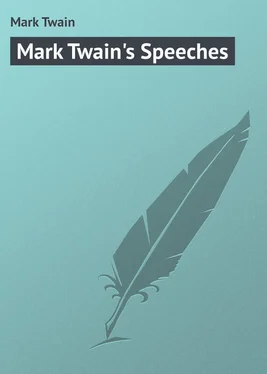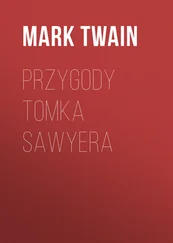Mark Twain - Mark Twain's Speeches
Здесь есть возможность читать онлайн «Mark Twain - Mark Twain's Speeches» — ознакомительный отрывок электронной книги совершенно бесплатно, а после прочтения отрывка купить полную версию. В некоторых случаях можно слушать аудио, скачать через торрент в формате fb2 и присутствует краткое содержание. Издательство: Array Иностранный паблик, Жанр: foreign_prose, на английском языке. Описание произведения, (предисловие) а так же отзывы посетителей доступны на портале библиотеки ЛибКат.
- Название:Mark Twain's Speeches
- Автор:
- Издательство:Array Иностранный паблик
- Жанр:
- Год:неизвестен
- ISBN:нет данных
- Рейтинг книги:3 / 5. Голосов: 1
-
Избранное:Добавить в избранное
- Отзывы:
-
Ваша оценка:
- 60
- 1
- 2
- 3
- 4
- 5
Mark Twain's Speeches: краткое содержание, описание и аннотация
Предлагаем к чтению аннотацию, описание, краткое содержание или предисловие (зависит от того, что написал сам автор книги «Mark Twain's Speeches»). Если вы не нашли необходимую информацию о книге — напишите в комментариях, мы постараемся отыскать её.
Mark Twain's Speeches — читать онлайн ознакомительный отрывок
Ниже представлен текст книги, разбитый по страницам. Система сохранения места последней прочитанной страницы, позволяет с удобством читать онлайн бесплатно книгу «Mark Twain's Speeches», без необходимости каждый раз заново искать на чём Вы остановились. Поставьте закладку, и сможете в любой момент перейти на страницу, на которой закончили чтение.
Интервал:
Закладка:
I was at a luncheon party, and Archdeacon Wilberforce was there also. I dare say he is Archdeacon now – he was a canon then – and he was serving in the Westminster battery, if that is the proper term – I do not know, as you mix military and ecclesiastical things together so much. He left the luncheon table before I did. He began this. I did steal his hat, but he began by taking mine. I make that interjection because I would not accuse Archdeacon Wilberforce of stealing my hat – I should not think of it. I confine that phrase to myself. He merely took my hat. And with good judgment, too – it was a better hat than his. He came out before the luncheon was over, and sorted the hats in the hall, and selected one which suited. It happened to be mine. He went off with it. When I came out by-and-by there was no hat there which would go on my head except his, which was left behind. My head was not the customary size just at that time. I had been receiving a good many very nice and complimentary attentions, and my head was a couple of sizes larger than usual, and his hat just suited me. The bumps and corners were all right intellectually. There were results pleasing to me – possibly so to him. He found out whose hat it was, and wrote me saying it was pleasant that all the way home, whenever he met anybody his gravities, his solemnities, his deep thoughts, his eloquent remarks were all snatched up by the people he met, and mistaken for brilliant humorisms.
I had another experience. It was not unpleasing. I was received with a deference which was entirely foreign to my experience by everybody whom I met, so that before I got home I had a much higher opinion of myself than I have ever had before or since. And there is in that very connection an incident which I remember at that old date which is rather melancholy to me, because it shows how a person can deteriorate in a mere seven years. It is seven years ago. I have not that hat now. I was going down Pall-Mall, or some other of your big streets, and I recognized that that hat needed ironing. I went into a big shop and passed in my hat, and asked that it might be ironed. They were courteous, very courteous, even courtly. They brought that hat back to me presently very sleek and nice, and I asked how much there was to pay. They replied that they did not charge the clergy anything. I have cherished the delight of that moment from that day to this. It was the first thing I did the other day to go and hunt up that shop and hand in my hat to have it ironed. I said when it came back, “How much to pay?” They said, “Ninepence.” In seven years I have acquired all that worldliness, and I am sorry to be back where I was seven years ago.
But now I am chaffing and chaffing and chaffing here, and I hope you will forgive me for that; but when a man stands on the verge of seventy-two you know perfectly well that he never reached that place without knowing what this life is heart-breaking bereavement. And so our reverence is for our dead. We do not forget them; but our duty is toward the living; and if we can be cheerful, cheerful in spirit, cheerful in speech and in hope, that is a benefit to those who are around us.
My own history includes an incident which will always connect me with England in a pathetic way, for when I arrived here seven years ago with my wife and my daughter – we had gone around the globe lecturing to raise money to clear off a debt – my wife and one of my daughters started across the ocean to bring to England our eldest daughter. She was twenty four years of age and in the bloom of young womanhood, and we were unsuspecting. When my wife and daughter – and my wife has passed from this life since – when they had reached mid Atlantic, a cablegram – one of those heartbreaking cablegrams which we all in our days have to experience – was put into my hand. It stated that that daughter of ours had gone to her long sleep. And so, as I say, I cannot always be cheerful, and I cannot always be chaffing; I must sometimes lay the cap and bells aside, and recognize that I am of the human race like the rest, and must have my cares and griefs. And therefore I noticed what Mr. Birrell said – I was so glad to hear him say it – something that was in the nature of these verses here at the top of this:
“He lit our life with shafts of sun
And vanquished pain.
Thus two great nations stand as one
In honoring Twain.”
I am very glad to have those verses. I am very glad and very grateful for what Mr. Birrell said in that connection. I have received since I have been here, in this one week, hundreds of letters from all conditions of people in England – men, women, and children – and there is in them compliment, praise, and, above all and better than all, there is in them a note of affection. Praise is well, compliment is well, but affection – that is the last and final and most precious reward that any man can win, whether by character or achievement, and I am very grateful to have that reward. All these letters make me feel that here in England – as in America – when I stand under the English flag, I am not a stranger. I am not an alien, but at home.
Dedication Speech
At the dedication of the college of the city of New York, may 16, 1908 Mr. Clemens wore his gown as Doctor of Laws, Oxford University. Ambassador Bryce and Mr. Choate had made the formal addresses.
How difficult, indeed, is the higher education. Mr. Choate needs a little of it. He is not only short as a statistician of New York, but he is off, far off, in his mathematics. The four thousand citizens of Greater New York, indeed!
But I don’t think it was wise or judicious on the part of Mr. Choate to show this higher education he has obtained. He sat in the lap of that great education (I was there at the time), and see the result – the lamentable result. Maybe if he had had a sandwich here to sustain him the result would not have been so serious.
For seventy-two years I have been striving to acquire that higher education which stands for modesty and diffidence, and it doesn’t work.
And then look at Ambassador Bryce, who referred to his alma mater, Oxford. He might just as well have included me. Well, I am a later production.
If I am the latest graduate, I really and sincerely hope I am not the final flower of its seven centuries; I hope it may go on for seven ages longer.
The Horrors Of The German Language
Address to the Vienna press club, November 21, 1897, delivered in German [A literal translation]
It has me deeply touched, my gentlemen, here so hospitably received to be. From colleagues out of my own profession, in this from my own home so far distant land. My heart is full of gratitude, but my poverty of German words forces me to greater economy of expression. Excuse you, my gentlemen, that I read off, what I you say will. [But he didn’t read].
The German language speak I not good, but have numerous connoisseurs me assured that I her write like an angel. Maybe – maybe – I know not. Have till now no acquaintance with the angels had. That comes later – when it the dear God please – it has no hurry.
Since long, my gentlemen, have I the passionate longing nursed a speech on German to hold, but one has me not permitted. Men, who no feeling for the art had, laid me ever hindrance in the way and made naught my desire – sometimes by excuses, often by force. Always said these men to me: “Keep you still, your Highness! Silence! For God’s sake seek another way and means yourself obnoxious to make.”
In the present case, as usual it is me difficult become, for me the permission to obtain. The committee sorrowed deeply, but could me the permission not grant on account of a law which from the Concordia demands she shall the German language protect. Du liebe Zeit ! How so had one to me this say could – might – dared – should? I am indeed the truest friend of the German language – and not only now, but from long since – yes, before twenty years already. And never have I the desire had the noble language to hurt; to the contrary, only wished she to improve – I would her only reform. It is the dream of my life been. I have already visits by the various German governments paid and for contracts prayed. I am now to Austria in the same task come. I would only some changes effect. I would only the language method – the luxurious, elaborate construction compress, the eternal parenthesis suppress, do away with, annihilate; the introduction of more than thirteen subjects in one sentence forbid; the verb so far to the front pull that one it without a telescope discover can. With one word, my gentlemen, I would your beloved language simplify so that, my gentlemen, when you her for prayer need, One her yonder-up understands.
Читать дальшеИнтервал:
Закладка:
Похожие книги на «Mark Twain's Speeches»
Представляем Вашему вниманию похожие книги на «Mark Twain's Speeches» списком для выбора. Мы отобрали схожую по названию и смыслу литературу в надежде предоставить читателям больше вариантов отыскать новые, интересные, ещё непрочитанные произведения.
Обсуждение, отзывы о книге «Mark Twain's Speeches» и просто собственные мнения читателей. Оставьте ваши комментарии, напишите, что Вы думаете о произведении, его смысле или главных героях. Укажите что конкретно понравилось, а что нет, и почему Вы так считаете.












